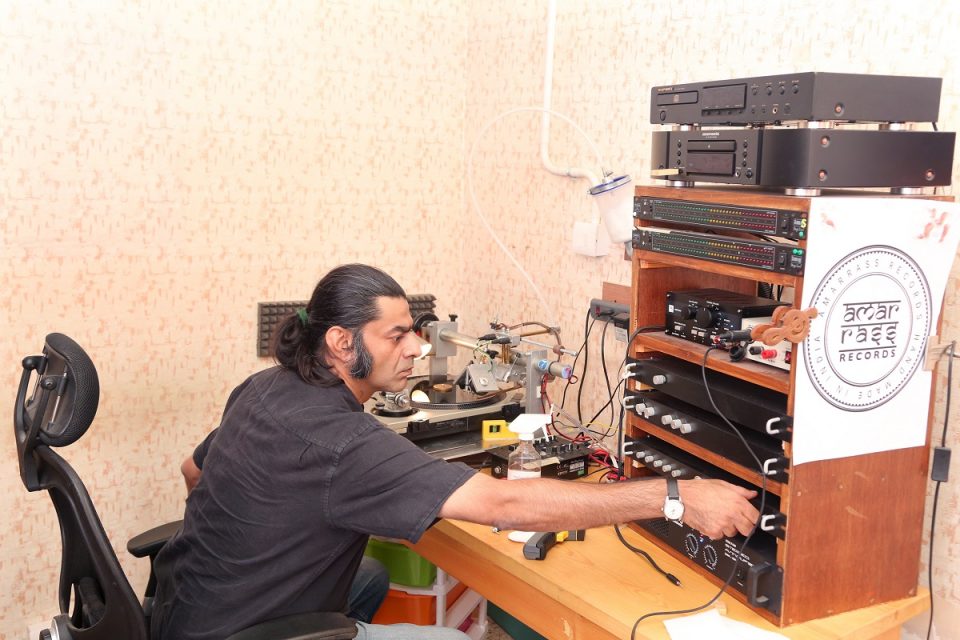How Amarrass Records Took Folk Music to Global Acclaim
The label’s latest release, ‘Dubfounded,’ brings together electronic music producer Ravana and folk poet Jumme Khan

Amarrass Records co-founder Ashutosh Sharma cutting a vinyl record at their workshop in Gurugram. Photo: Gulshan Sachdeva
Ask Ankur Malhotra and Ashutosh Sharma from Madison/New Delhi-based Amarrass Records how they manage work between two countries and their first reaction is to manage a laugh. “It’s been vaguely defined,” Sharma says, while Malhotra adds, “It’s been kind of crazy.”
Amarrass – a global music label which also manages folk, rock and electronic artists – completes 10 years in 2019. “We’re constantly back at the drawing board, with technology changing and so on,” Sharma says. It’s the age of streaming and downloads, but the duo have managed to bring in their own vinyl cutting machine and set up shop in Gurugram, where each LP is cut in real-time, based on the number of songs on each side.
The label is arguably one of the only one in India to make their own vinyl records, out of their own shop, cutting out any middlemen who they would have to place orders from and then battle enormous shipping charges to bring down. Malhotra says, “Indian is a very nascent market when it comes to vinyl but case in point is Dubfounded, we shipped orders to South Africa, Maldives, Denmark, Spain and the U.S., so it’s going places.” He’s talking about their latest release, a collaboration between “militant dub” music producer Ravana and Alwar, Rajasthan folk poet Jumme Khan.

Ashutosh Sharma holding up Amarrass Records’ latest release, ‘Dubfounded.’ Photo: Gulshan Sachdeva
Released on April 19th, the album was something of a familiar Amarrass signature – bringing together the contemporary and folk worlds in India. Sharma says the intention with the label was very much to get younger audiences to appreciate India’s folk music roots. Malhotra adds, “We knew the masters – like the blues masters of the Mississippi Delta. It was about creating those kind of identities for the Indian equivalents.”
It was in 2010 that Amarrass began to gain larger attention, after their album featuring music by Rajasthani folk project The Manganiyar Seduction by Roysten Abel was launched at New Delhi’s Purana Qila with over 4,000 people in attendance. Sharma says, “They got to know Amarrass Records but they didn’t know the name of any artists on stage.” Following the launch, Amarrass headed back into Rajasthan’s long-standing folk music territories, aiming to “create their identities.”
In that time, Sharma (who also works as a travel agent) and Malhotra (who works in community radio and is co-partner at music publication, Madison Music Review) recorded and released the music and poetry of Rajasthani folk artists such as Sindhi sarangi player and vocalist Lakha Khan and Padma Shri awardee Sakar Khan (who played kamancha), as part of the At Home series in 2012. They borrowed a field recorder from a friend who was a radio journalist, 10 tapes for recording and two mics and cables. “Whether it was recording, mixing and mastering – we did that all by talking it out and figuring it out. We spoke to sound engineers if we ever came across any problems,” Sharma says.

Album artwork for albums by Painted Caves and Barmer Boys in the process of printing. Photo: Courtesy of Amarrass Records
At the Amarrass Desert Music Festival in 2011, The Barmer Boys made their stage debut, becoming the contemporized folk project that would take Rajasthani folk music around the globe. By 2014, the trio performed at Roskilde Festival in Denmark, on the same day as The Rolling Stones and hip-hop group OutKast. Malhotra says it was “fundamental” for Barmer Boys to get international recognition – something that carries forward even today with regular Europe and North American sojourns – through the Roskilde performance. “That’s sadly the Indian mentality – foreign returned, so ‘kuch toh hai’ (‘There’s something to them’). This is one of the struggles, because growing up in India, we never got exposed to traditional and ‘rural’ music – because perhaps it wasn’t considered ‘sophisticated’ for an urban audience, which is all BS,” he says. He likens it to what many would feel while watching a rock band except this was Rajasthani folk. “It was about trying to turn the tables and getting the music acknowledged for its power, emotion and intensity,” Malhotra adds.

Amarrass Records co-founder Ankur Malhotra at the vinyl-cutting machine. Photo: Ashutosh Sharma
Even years before the release of Barmer Boys’ album Kesariya Balm in 2017, Amarrass became a known name to Rajasthani folk musicians. When the duo visited villages to record early compilations such as Mitha Bol and Banko Ghodo (2012), people knew them as the ones who put together Barmer Boys. Since it’s a band that has to come up material to record, Sharma says the popularity of other Rajasthani folk songs like “Padosan” and “Bole To Mitho Lage” have increased thanks to other musicians following suit. Sharma adds, “A lot of the songs we now listen to, are musicians giving their own rendition, which is good. All you heard before was ‘Nimbooda’ and ‘Kesariya Balam.’”
Along the way, Amarrass have become more than just a go-to label for Rajasthani folk music. They’ve signed Palestinian-American psychedelic band Painted Caves, Mali artist Madou Sidiki Diabate (who plays an enchanting string instrument called the kora), Indo-Russian fusion project The Blue Infinity and more. Up next, there’s a launch gig for Dubfounded and a release featuring Lakha Khan and Diabate together, plus a selection of live performances of their artists, cut on LP.
Ravana and Barmer Boys perform at Auro Kitchen and Bar, New Delhi on June 6th, 2019. Event details here.
Watch the video for Ravana and Jumme Khan’s “Ways of the World (Karigari re Kalyug)”







